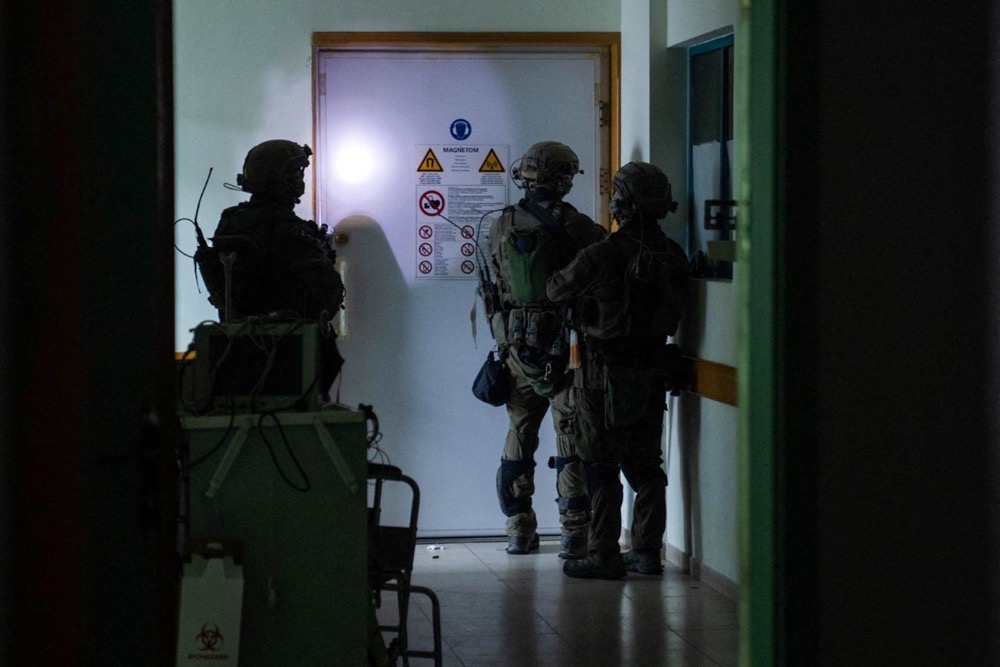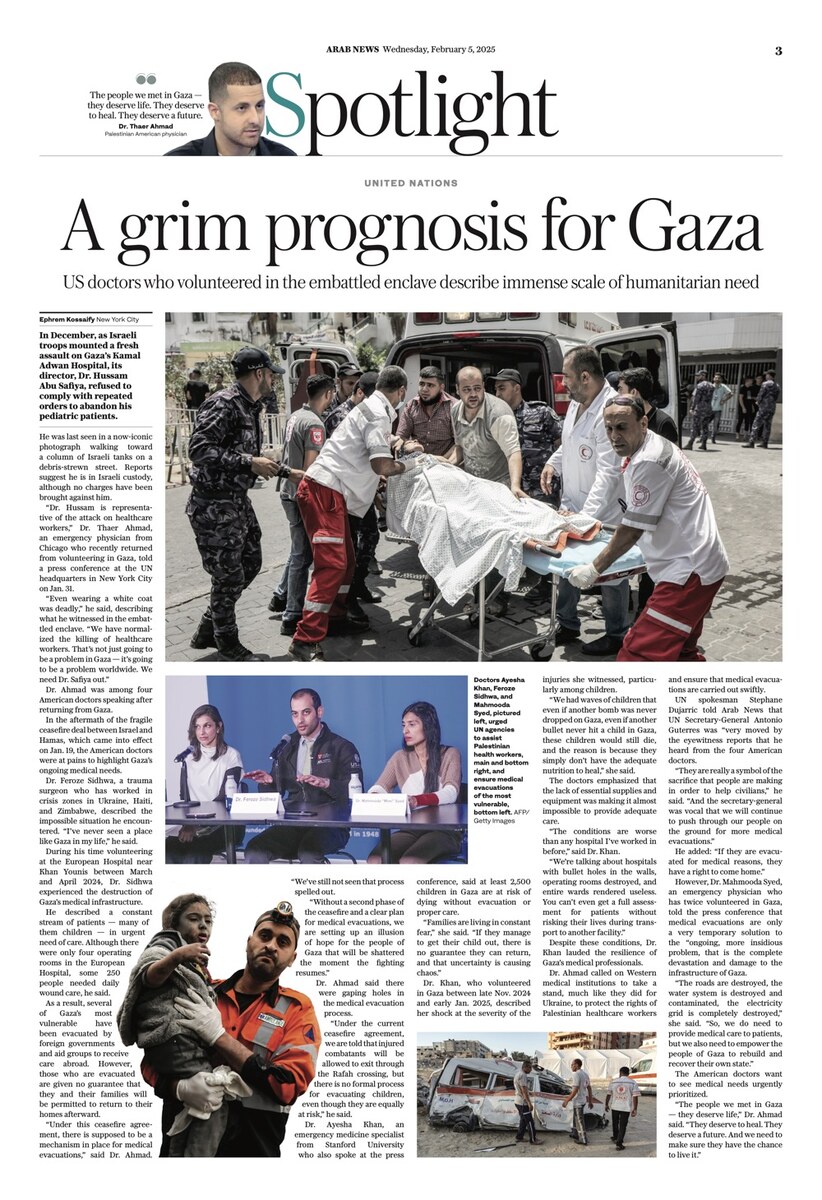NEW YORK CITY: In December, as Israeli troops mounted a fresh assault on Gaza’s Kamal Adwan Hospital, its director, Dr. Hussam Abu Safiya, refused to comply with repeated orders to abandon his pediatric patients.
Just weeks earlier, the Palestinian doctor had buried his 15-year-old son, Ibrahim, in the hospital’s courtyard after he was killed in a drone strike. In November, he suffered shrapnel injuries of his own.
Even as Israeli forces mounted further air attacks around the hospital — claiming it was being used to shelter Palestinian militants — Dr. Abu Safiya refused to abandon his post until he was finally detained.
He was last seen in a now-iconic photograph walking toward a column of Israeli tanks on a debris-strewn street. Reports suggest he is in Israeli custody, although no charges have been brought against him.

A paramedic carries a girl that was rescued from the rubble of a collapsed building to receive medical care at the Ahli Arab hospital. (AFP/File)
“Dr. Hussam is representative of the attack on health care workers,” Dr. Thaer Ahmad, an emergency room physician from Chicago who recently returned from volunteering in Gaza, told a press conference at the UN headquarters in New York City on Jan. 31.
“Even wearing a white coat was deadly,” he said, describing what he witnessed in the embattled enclave. “We have normalized the killing of healthcare workers. That’s not just going to be a problem in Gaza — it’s going to be a problem worldwide. We need Dr. Safiya out.”
Israel has consistently denied deliberately targeting civilian infrastructure, claiming that Palestinian militants have used hospitals and residential buildings to store weapons and launch attacks, employing their occupants as human shields.
Since the Oct. 7, 2023, Hamas-led attack on southern Israel triggered the war in Gaza, some 62,000 Palestinians have been killed, according to the latest estimates, and much of the enclave’s infrastructure left in ruins by Israeli bombardment.
Dr. Ahmad was among four American doctors speaking after having returned from Gaza. While war’s horrors are often unfathomable from afar, the visceral realities they described have been burned into their memories forever.
They spoke of treating wounded children, watching Gaza’s healthcare system collapse, and struggling to save lives amid overwhelming destruction.

Palestinians inspect the damage at Gaza’s Al-Shifa hospital after the Israeli military withdrew from the complex housing the hospital on April 1, 2024. (AFP/File)
In the aftermath of the fragile ceasefire deal between Israel and Hamas, which came into effect on Jan. 19, the American doctors were at pains to highlight Gaza’s ongoing medical needs and the obstacles that healthcare workers face.
Despite a lull in the fighting, they warned that the suffering would continue and the death toll would rise if aid was not allowed to flow freely. By sharing their accounts, they hoped to encourage a coordinated effort to address the crisis.
Dr. Feroze Sidhwa, a trauma surgeon who has worked in crisis zones in Ukraine, Haiti, and Zimbabwe, described the impossible situation he encountered. “I’ve never seen a place like Gaza in my life,” he said.
During his brief time volunteering at the European Hospital in Al-Fukhari near Khan Yunis between March and April 2024, Dr. Sidhwa experienced the destruction of Gaza’s medical infrastructure.
He described a constant stream of patients — many of them children — in urgent need of care. Although there were only four operating rooms in the European Hospital, some 250 people needed daily wound care, he said.
Even more grim was the lack of trained medical personnel. According to Dr. Sidhwa, roughly one in 10 healthcare workers in Gaza have fled, and around one in 20 have been killed.
Many of Gaza’s most experienced doctors — those who ran departments and performed complex surgeries — are either dead, detained, or missing. The destruction of both human and physical resources has left the healthcare system on the brink of collapse.

An Israeli soldiers carrying out operations inside Al-Shifa hospital in Gaza City. (AFP/File)
As a result, several of Gaza’s most vulnerable have been evacuated by foreign governments and aid groups to receive care abroad. However, those who are evacuated are given no guarantee that they and their families will be permitted to return to their homes afterward.
“Under this ceasefire agreement, there is supposed to be a mechanism in place for medical evacuations,” said Dr. Ahmad. “We’ve still not seen that process spelled out.
“Without a second phase of the ceasefire and a clear plan for medical evacuations, we are setting up an illusion of hope for the people of Gaza that will be shattered the moment the fighting resumes.”
Dr. Ahmad said there were gaping holes in the medical evacuation process.
“Under the current ceasefire agreement, we are told that injured combatants will be allowed to exit through the Rafah crossing, but there is no formal process for evacuating children, even though they are equally at risk,” he said.
“If we can let an injured combatant out with three companions then surely we can ensure that children can be evacuated with their caregivers.”

This view shows the infant incubators at the ransacked neonatal intensive care unit (NICU) inside the heavily-damaged Kamal Adwan hospital in Beit Lahia. (AFP/File)
Dr. Ayesha Khan, an emergency medicine specialist from Stanford University who also spoke at the press conference, said at least 2,500 children in Gaza are at risk of dying without evacuation or proper care.
“Families are living in constant fear,” she said. “If they manage to get their child out, there is no guarantee they can return, and that uncertainty is causing chaos.
“We know that chaos in a medical system increases mortality by 30 percent. Just by creating confusion, uncertainty, you are creating a 30 percent more effective killing machine.
“And this is exactly where the UN secretary-general, the UN organizations can help, because organizations bring organization and what we are advocating for, very strongly, is to have a centralized process, clear guidelines, and to have COGAT put in writing what is needed, both for what can enter into Gaza and what is needed to exit.”
COGAT is the Coordinator of Government Activities in the Territories — a unit in the Israeli Ministry of Defense tasked with overseeing civilian policy in the West Bank, as well as facilitating logistical coordination between Israel and the Gaza Strip.
Dr. Khan, who volunteered in Gaza between late Nov. 2024 and early Jan. 2025, described her shock at the severity of the injuries she witnessed, particularly among children.

Palestinian paramedics cry outside Al-Shifa hopsital in Gaza City on October 16, 2023, amid continuing bombardment by Israeli forces of the Hamas-run Plaestinian territory. (AFP/File)
“We had waves of children that even if another bomb was never dropped on Gaza, even if another bullet never hit a child in Gaza, these children would still die, and the reason is because they simply don’t have the adequate nutrition to heal,” she said.
She described the case of one girl whose foot injuries, caused by shrapnel, had gone untreated for months. Without access to basic nutrition or proper medical care, the wounds had festered and become infected.
In Gaza, where sewage-laden streets replace what might have been hospital rooms or secure shelters, these injuries would likely result in amputation — a fate that many children had suffered.
Opinion
This section contains relevant reference points, placed in (Opinion field)
The doctors emphasized that the lack of essential supplies and equipment — including CT scanners, hospital beds, and even basic medications — was making it almost impossible to provide adequate care.
“The conditions are worse than any hospital I’ve worked in before,” said Dr. Khan.
“We’re talking about hospitals with bullet holes in the walls, operating rooms destroyed, and entire wards rendered useless. You can’t even get a full assessment for patients without risking their lives during transport to another facility.”
Despite these conditions, Dr. Khan also described the resilience she witnessed among Gaza’s medical professionals.

Palestinian paramedic inspects the remains of a destroyed ambulance at the scene of bombardment in Khan Yunis. (AFP/File)
“Eighty percent of the healthcare workers at the hospital I worked in were volunteers,” she said. “These people are living in tents, getting one meal a day, yet they show up to work every single day, putting their lives on the line for their people. They are heroes.”
However, this resolve is being tested by the mounting restrictions, insufficient support, and a lack of international pressure on the parties involved to facilitate a proper aid response.
Dr. Ahmad called on Western medical institutions to take a stand, much like they did for Ukraine, to protect the rights of Palestinian healthcare workers and ensure that medical evacuations are carried out swiftly.
“The international medical community has a responsibility to advocate for these basic rights,” he said. “We cannot stand idly by and let this crisis escalate further. The people of Gaza deserve access to the care they need, and the world must not turn a blind eye.”
Palestinian health professionals like Dr. Abu Safiya, the detained director of Kamal Adwan Hospital, must be free and properly resourced to rebuild Gaza’s health system and deliver the urgently needed care, he said.

Dr. Ayesha Khan, Dr. Feroze Sidhwa, and Dr. Mahmooda Syed, the medical doctors with critical-care experience in Gaza Strip hospitals since 7 October discuss immediate priorities for rebuilding Gaza's health system. (Getty Images)
“Palestinians need to lead the response. Palestinians need to be treating Palestinians. And we need to be able to support that. And that’s what we mentioned to UN Secretary-General Antonio Guterres, and he firmly believes in that as well.”
UN spokesman Stephane Dujarric told Arab News that Guterres was “very moved by the eyewitness reports that he heard from the four American doctors.
“They are really a symbol of the sacrifice that people are making in order to help civilians,” he said. “And the secretary-general was vocal that we will continue to push through our people on the ground for more medical evacuations.”
He added: “If they are evacuated for medical reasons, they have a right to come home.”
However, Dr. Mahmooda Syed, an emergency physician who has twice volunteered in Gaza, told the press conference that medical evacuations are only a very temporary solution to the “ongoing, more insidious problem, that is the complete devastation and damage to the infrastructure of Gaza.

People walk outside the heavily-damaged Kamal Adwan hospital in Beit Lahia. (AFP/File)
“The roads are destroyed, the water system is destroyed and contaminated, the electricity grid is completely destroyed,” she said. “So, we do need to provide medical care to patients, but we also need to empower the people of Gaza to rebuild and recover their own state.”
The American doctors said they want to see medical needs urgently prioritized.
“The people we met in Gaza — they deserve life,” Dr. Ahmad said. “They deserve to heal. They deserve a future. And we need to make sure they have the chance to live it.”





























